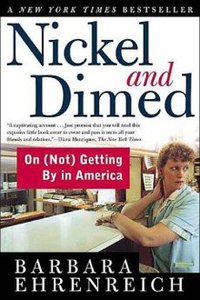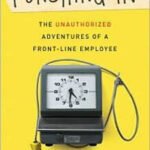Nickel and Dimed: On (Not) Getting By in America by Barbara Ehrenreich (2001) | Book Review
 Nickel and Dimed: On (Not) Getting By in America by Barbara Ehrenreich
Nickel and Dimed: On (Not) Getting By in America by Barbara Ehrenreich Genres: Non-Fiction
Original Publication Date: 2002
Source: I purchased this book
Goodreads

Millions of Americans work full-time, year-round, for poverty-level wages. In 1998, Barbara Ehrenreich decided to join them. But how does anyone survive, let alone prosper, on $6 an hour? To find out, Ehrenreich left her home, took the cheapest lodgings she could find, and accepted whatever jobs she was offered. Moving from Florida to Maine to Minnesota, she worked as a waitress, a hotel maid, a cleaning woman, a nursing home aide, and a Walmart sales clerk. Nickel and Dimed reveal low-rent America in all its tenacity, anxiety, and surprising generosity―a land of Big Boxes, fast food, and a thousand desperate stratagems for survival.
Table Of Contents
Nickel And Dimed Showed A Different America
Barbara Ehrenreich’s non-fiction book Nickel and Dimed: On (Not) Getting By in America has become a classic of undercover investigative reporting.
Ehrenreich has a Ph.D. in Biology but went undercover as a low-wage worker in three very different parts of America: Florida, Maine, and Minnesota.
She wanted to see if she could make a living at jobs that barely pay the minimum wage. This book entails what happened to her while she was doing this during 1998-2000.
Florida
Ehrenreich first worked in Key West, Florida in the service industry. She applied for jobs as a cleaning woman in the many hotels in the area. Ehrenreich discovered that because she was white she was always considered for waitressing jobs instead.
As a waitress, she earned $2.43 an hour, plus tips. Even with the tips she barely made the minimum wage. The low wages for such physically demanding work were bad. However, the real problems were the lack of affordable health care and the high cost of housing.
Ehrenreich even ends up in a trailer park to try to save on rent. One waitress was mourning her boyfriend, who was killed in a scuffle in prison:
And after he was gone she spent several months living in her truck, peeing in a plastic pee bottle and reading by candlelight at night, but you can’t live in a truck in the summer, since you need to have the windows down, which means anything can get in, from mosquitoes on up.
Ehrenreich is disgusted with the managers of the restaurant.
She walks out after one of the managers screams and throws things. Barbara just leaves, with customers waiting and other work getting undone. She has the freedom to do this because this is not her real life.
Maine
Ehrenreich “chose Maine for its whiteness.” She had also heard that the Portland area needed minimum-wage workers. Most apartments were $1,000 per month and up, clearly not affordable on those salaries.
Ehrenreich found a weekend job as a nursing home aide and a weekday job in a cleaning service called “The Maids”. She also finds a place to live for $120.00 a week, and with her two jobs, she can barely make it. Working 7 days a week is rough, too.
She starts to like working at the nursing home. The cleaning job is brutal and physically exhausting, Some of the workers only eat one meal a day. They don’t make enough money to buy food in quantity. Some must rely on food vouchers to buy food.
Minnesota
Ehrenreich goes to Minnesota and works in a Walmart, not as a salesperson, but as putting clothes away from the fitting rooms and folding the clothes on the sales floor. There are many carts of clothes to put away each day:
At Wal-Mart, as opposed to say Lord & Taylor, customers shop with supermarket-style shopping carts, which they can fill to the brim before proceeding to the fitting room.
There the rejected items, which are about 90 percent of the try-ons, are folded and put on hangers by whoever is staffing the fitting room, then placed in fresh shopping carts for Melissa and me. So this is how we measure our workload –in carts.
Ehrenreich likes her manager, but the job is monotonous. Most of the workers cannot afford to buy medical insurance. Ehrenreich never works on a cash register. She is horrified by the retail culture, where customers are referred to as “guests” and employees as “associates”.
The job is tiring because of the late nights, and she is weary when she gets home. As always, the most difficult part of working a job such as this is finding a place to live that she can afford on her Wal-Mart salary, which is $7.00 an hour. She lives in a frightening motel where she feels very vulnerable and unsafe, but still charges the outrageous weekly rent of $245.00. Barbara finally concedes defeat and realizes that she simply cannot make it in Minnesota on Wal-Mart wages and the high rent of motels.
Final Analysis
The biggest weakness of Nickel and Dimed is that Ehrenreich can just leave anytime she wants to. She also has a cushion of over $1,000 to fall back on. One of her rules for the project is that she won’t be homeless. She’ll fall back on her cushion if she needs to do so.
On the other hand, she is very brave. By living in trailer parks and motel rooms that are not in safe neighborhoods, she was putting herself in very risky situations when she did not have to do so. I admire that.
Nickel and Dimed: On (Not) Getting By in America is an important book that should be read by everyone interested in how the almost invisible class of the working poor try to survive in an America of low wages, extremely high rents, and no national health care.
UPDATE
You can read this great 2020 New Yorker piece about Ehrenreich:
Barbara Ehrenreich Is Not an Optimist, but She Has Hope for the Future
Further Reading
Punching In: The Unauthorized Adventures of a Front-Line Employee by Alex Frankel.
Please read my other posts on RESISTANCE and politics:
Heronfield by Dorothy Balchin | Book Review
Marie: A True Story by Peter Maas | Book Review
How the Good Guys Finally Won: Notes From An Impeachment Summer by Jimmy Breslin | Book Review
All the President’s Men by Bob Woodward and Carl Bernstein | Book Review
Nickel and Dimed: On (Not) Getting By in America by Barbara Ehrenreich | Book Review
and some other book reviews:
A Tree Grows in Brooklyn by Betty Smith | Book Review
Drinking: A Love Story by Caroline Knapp | Book Review
Diary of a Mad Housewife by Sue Kaufman | Book Review
The Bell Jar by Sylvia Plath | Book Review
Cassandra at the Wedding by Dorothy Baker | Book Review
Cheaper by the Dozen by Frank B. Gilbreth, Jr. and Ernestine Gilbreth Carey | Book Review
and check out my other blog:
American Labor Museum | Haledon, New Jersey
March For Our Lives in Morristown!
Delicious Orchards 2023 | Colts Neck, New Jersey
First Presbyterian Church of Oxford at Hazen and the Spooky Graveyard 2023 | Belvidere, New Jersey
The Historic Cooper Gristmill | Chester Township, New Jersey
The Little Red Schoolhouse | Florham Park, New Jersey
Clara Barton Schoolhouse | Bordentown, New Jersey
Greystone Park Psychiatric Hospital Is About To Be Torn Down 2015 | Morris Plains, New Jersey
Thank you for reading The Literary Lioness!






6 Comments
Man of la Books
Hi,
I like your review a lot, but I also disagree with your it, I started reading this book and thought it was a joke and deamining.
First of all, peple who make minimum wage don't shop at the mall, they know exactlly where to go to find $1 shirts and $5 jeans, as do I (a former warehouse worker).
Second, being a maid is not deaming. It is an honorable job even though it doesn't pay much. She repeats the "no honor" mantra which I think is jut not right.
Third, the author is obviously pushing an agenda. Just imagine how much would your hotel bill will be if the hotels paid maids $40 – $60K a year.
The Literary Lioness
@Man of la Books — The minimum wage is still way too low in this country, and rents are too high. And we need national health care!(It works in Europe, it can work here). You simply cannot survive on minimum wage, which has barely changed in the past 20 years!
I worked for a company that paid minimum wage to many of the new workers, and they paid the CEO of the company about $16 million a year! He gets a private jet and his personal makeup artist (paid for by the company), in addition to other perks! Meanwhile the company was cutting the minimum wage jobs. This was during the current recession.
Something is really wrong somewhere. This book is not a joke. Yes, the author had an agenda, and she backed up what she wrote about. If you actually read the book, you'd see that even she was shocked at the rents she had to pay, and how backbreaking the work was.
Gina
I also disagree with this book and the whole premise of it. I remember seeing Oprah meet with the author and thinking "This is ridiculous!"
Claiming that rent is upwards of $1000 anywhere you go is ludicrous. When we were first married we had a very cute apartment in a decent part of Phoenix (big city usually means big rents) for $600. This was in 2003. Not 1983.
Second, minimum wage is NOT intended for adults to support families. It is for the untrained, uneducated, unskilled to have a fair shake STARTING in the work force. Any adult who stays at minimum wage for an extended period of time has themselves to blame as much as anybody around them.
And I also agree with Man of la Books, there needs to be a hierarchy of wages. Imagine the dismal state our economy would be in if everybody made exactly $50K. Nobody would do the hard work. Nobody would put in the long hours needed to run a company, and nobody would ever do any more than the bare minimum.
"When everybody is special, nobody is", right? Well, when everybody is "rich" then nobody is. Thinking we can provide perfect equality when nobody ever has is folly.
If you want to be upset about the imbalance of CEO paychecks, that's fine. But, here are a few points to consider. Those men and women virtually sell their souls for those wages. 80 work weeks for decades at a time. No meaningful family, friends, etc. What price is your family worth? Mine's not worth 16 million, so I'll never even try for something like that.
Second, if the government would keep their grubby hands out of the private sector then these companies would have to face reality. They would restructure or fold.
Sorry. I think this one is way off. I still love your reviews, and I am still an avid follower, but I think this book is way off mark.
The Literary Lioness
@Gina — I don't agree with everything the book says, because Ehrenreich definitely has a lot of contempt for certain people, but I still say that rents are WAY too high and that we need some kind of national health insurance. My relatives in Europe never have to worry about health care or being taken care of when they are elderly. They didn't even have to pay for college!
Everyone talks about "creating jobs", but if they are minimum wage jobs that no one can live on, then what's the point? And the hours that you must work many of these jobs, nights and weekends in addition to day hours, makes it difficult to get a second job.
Another problem (not addressed in the book at all)is also that the old style jobs that supported economies in many places, such as factories and steel mills and the like, are GONE and are NOT coming back. Even John McCain said so. So the people who used to work at these jobs are now doing retail, cleaning, etc. Someone has to do these jobs.
Ehrenreich never says in the book that the people in it should be making extremely high wages. What she is saying is that with crazy rents and no health care, the jobs don't even provide a living wage.
We could say that all of these people should go back to school and get degrees and get better jobs, but where are those jobs??? Where I live (in a very expensive state to live in), I know of professionals who have been out of work for over two years. It's difficult to even get an INTERVIEW for those jobs now.
I know someone — a college graduate — who took six months just to get a job in RETAIL paying $7.50 an hour. There are at least six people applying for each job, and sometimes hundreds. In my state they are freezing job hiring and cutting thousands of jobs!
It's also really sick that while these huge companies cut jobs and pay so little and then they give their executives such ridiculously high wages. This is one of the biggest reasons why the economy has tanked. I have no problems with executives making good salaries, but they should not be making so much, especially when they are so busy cutting jobs! If their company is LOSING money, then the CEO and other executives should not be getting bonuses, raises and bailouts! It's just disgusting. If they don't stop this, the American economy is in big trouble and will not recover. This may signal the end of capitalism as we know it. It's sad, but it's simply not working.
The Literary Lioness
@Gina — I forgot to add this: The reason some of the waitresses were living in their cars instead of an apartment was not so much the rent, but the security deposit and first months rent that must be paid before you can get an apartment. That is a major problem for many of these people.
One of the waitresses in the book was thrilled when the manager of the hotel let her park her truck –her home — in the parking lot at night. That was enough incentive to let her stay in the job.
I know from my own experience that usually really cheap apartments are usually in high-crime neighborhoods and filled with roaches, rats and mice. I've lived with them all! It's just a terrible way to live, and the landlords don't care. And you have to carefully sidestep the crack vials on the sidewalk. Ugh! It has all scarred me for life.
Gina
I absolutely, 100% agree with the fact that if a company is losing money, then salary cuts at the top are the first place to look.
As for the rest, I think we will have to agree to disagree, because I am sure we both have plenty of anecdotes and statistics and stories to prove our points.
Still following, still reading and commenting:)